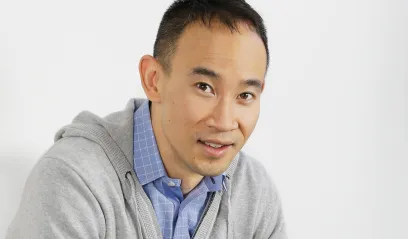August 20, 2015
| by Erika Brown EkielDennis Yang is CEO at Udemy, a marketplace where people can take affordable online courses from experts around the world. The company offers more than 30,000 different courses, typically for less than $100, in subjects such as the Python programming language, data analysis, office productivity, even origami paper folding and craft beer brewing. Udemy has taught 7 million students, two-thirds of whom are located outside the United States. The company has 200 employees. Yang earned an MBA from Stanford Graduate School of Business in 2002. He talks to us about the gray zone of being a startup CEO, the dangers of having your head on a swivel, and the thrill of being out of control.
In 10 words or fewer, what is the big idea behind your business?

Dennis Yang | Courtesy
Udemy is an online marketplace where anyone in the world can learn or teach anything.
What is the best advice you’ve ever received?
A few years ago a board member told me that in order to stay relevant and competitive you have to keep adding new and relevant skills. My role as CEO is very different with 200 employees than it was with 50 people. You need to continue to evolve if you are going to lead a company through the different phases of its life, and no one is going to do it for you. It’s hard to overstate that the pace of change in our environment continues to accelerate.
What was the most difficult lesson you have learned on the job?
Prioritization and focus. There has been a lot of hype around our market, particularly the idea of re-engineering higher education. We were under a massive gravitational pull to move into that piece of the market. We tried it a few years ago and began a project geared toward university and college professors. It just wasn’t us. We didn’t come from a traditional faculty environment and we didn’t operate on the same wavelength. We didn’t have the DNA to support those areas. We ended up making the tough call not to pursue it anymore and focus on what we came here to do.
An important part of that lesson is recognizing who you really are. So many entrepreneurs chase the shiny new toy. The zig and zag is necessary initially to get something started and find product/market fit, but if you keep doing that it can kill you. Entrepreneurs always have their heads on a swivel. It is hard on the employees if they get whipped around a lot.
What advice would you give other entrepreneurs on how to build a great business?
Learn to manage your own psychology. The ups and downs come at you hour by hour. The site goes down or there are people on the management team with different opinions. If you let that rule your life it will be a difficult ride. My approach is to be like a duck. Above water it looks like everything is going smoothly, but beneath the water you are paddling like mad. You need to take care of yourself physically and emotionally, and you need a support network.
What is your greatest achievement?
Building a company culture that will outlast me. It self-curates and self-polices.
What do you consider your biggest failure?
Earlier in my career I did product management work. I felt like it was something I should do but I never really loved it and stayed in it too long. At some point in your life you need to just do what you like. For me that’s the excitement of building and scaling a company.
What values are important to you in business?
Humility. And matching accountability to ownership.
Why are you an entrepreneur?
The dynamic pace, the thrill. The control and the complete lack of control.
What was your first paying job?
My first professional job was an internship in college. I was studying to become a chemical engineer and my job was to design safety valves for chemical reactors. When I thought about it, I worried I was going to get someone killed. I thought, “I should not be doing this!”
What is the best business book you have read?
Ben Horowitz’s The Hard Thing About Hard Things. Unless you’ve done it, you just don’t have enough empathy around what it means to build a company. You have the least number of people to talk to but you need it the most. The decisions are not black and white. There is so much gray.
What businessperson do you most admire?
Elon Musk. He is trying to do something big and audacious, tackling things that are core problems for society at large. The progress he’s made is astonishing.
For media inquiries, visit the Newsroom.






